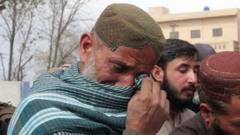In a shocking event that transfixed the nation, the Jaffar Express train was violently hijacked in the remote Bolan Pass of Balochistan, Pakistan, on Tuesday. Over 400 passengers, including families and security personnel, found themselves in a nightmare when armed militants bombed the tracks, halted the train, and unleashed a barrage of gunfire.
Among the stunned passengers was Mehboob Hussain, who vividly recounted the moment everything changed. "The tracks exploded beneath us, and then the shooting began," he shared with BBC Urdu. This was not just an ordinary rail journey; it was a perilous escape from danger as members of the Balochistan Liberation Army (BLA) claimed responsibility for the siege, threatening the lives of the passengers unless their demands for the release of political prisoners were met within 48 hours.
This outrageous act of terrorism marked the first instance of a train hijacking carried out by the BLA, known for its violent campaign for Balochistan's independence. While authorities reported the rescue of 300 hostages, the whereabouts of nearly 140 people remain unknown, raising concerns about the fate of those still in captivity.
Eyewitnesses described harrowing scenes of chaos inside the train. Ishaq Noor recounted living through a "doomsday scene" as gunfire erupted, creating an atmosphere of sheer panic. The police officer on board indicated that the militants effectively outnumbered initial defenses, leading to a desperate fight for survival among those trapped.
As night fell, gunfire punctuated the darkness, with some passengers witnessing fellow travelers being brutally killed. Despite the horror, a handful of individuals, including women, children, and the elderly, were released unharmed. Noor Muhammad told of escaping with his wife, guided by the militants who forced them out under the threat of violence.
The tense standoff stretched for over 30 hours before military forces initiated a rescue operation. On Wednesday morning, as the call to prayer resounded, the Frontier Corps launched an assault on the remaining militants. Amid the chaos, some hostages seized their chance to flee to safety.
Amidst the grim aftermath, dozens of coffins were prepared at Quetta railway station in anticipation of casualties. The military confirmed that some militants fled, taking additional hostages, and efforts continue to locate the missing passengers.
In the face of unimaginable danger, survivors reflect on their escape with gratitude. "Thank God He saved us," said Noor, now a symbol of resilience amidst terror. As investigations continue, the events surrounding this hijacking serve as a stark reminder of Balochistan's ongoing struggle and deep-seated unrest.
Among the stunned passengers was Mehboob Hussain, who vividly recounted the moment everything changed. "The tracks exploded beneath us, and then the shooting began," he shared with BBC Urdu. This was not just an ordinary rail journey; it was a perilous escape from danger as members of the Balochistan Liberation Army (BLA) claimed responsibility for the siege, threatening the lives of the passengers unless their demands for the release of political prisoners were met within 48 hours.
This outrageous act of terrorism marked the first instance of a train hijacking carried out by the BLA, known for its violent campaign for Balochistan's independence. While authorities reported the rescue of 300 hostages, the whereabouts of nearly 140 people remain unknown, raising concerns about the fate of those still in captivity.
Eyewitnesses described harrowing scenes of chaos inside the train. Ishaq Noor recounted living through a "doomsday scene" as gunfire erupted, creating an atmosphere of sheer panic. The police officer on board indicated that the militants effectively outnumbered initial defenses, leading to a desperate fight for survival among those trapped.
As night fell, gunfire punctuated the darkness, with some passengers witnessing fellow travelers being brutally killed. Despite the horror, a handful of individuals, including women, children, and the elderly, were released unharmed. Noor Muhammad told of escaping with his wife, guided by the militants who forced them out under the threat of violence.
The tense standoff stretched for over 30 hours before military forces initiated a rescue operation. On Wednesday morning, as the call to prayer resounded, the Frontier Corps launched an assault on the remaining militants. Amid the chaos, some hostages seized their chance to flee to safety.
Amidst the grim aftermath, dozens of coffins were prepared at Quetta railway station in anticipation of casualties. The military confirmed that some militants fled, taking additional hostages, and efforts continue to locate the missing passengers.
In the face of unimaginable danger, survivors reflect on their escape with gratitude. "Thank God He saved us," said Noor, now a symbol of resilience amidst terror. As investigations continue, the events surrounding this hijacking serve as a stark reminder of Balochistan's ongoing struggle and deep-seated unrest.


















